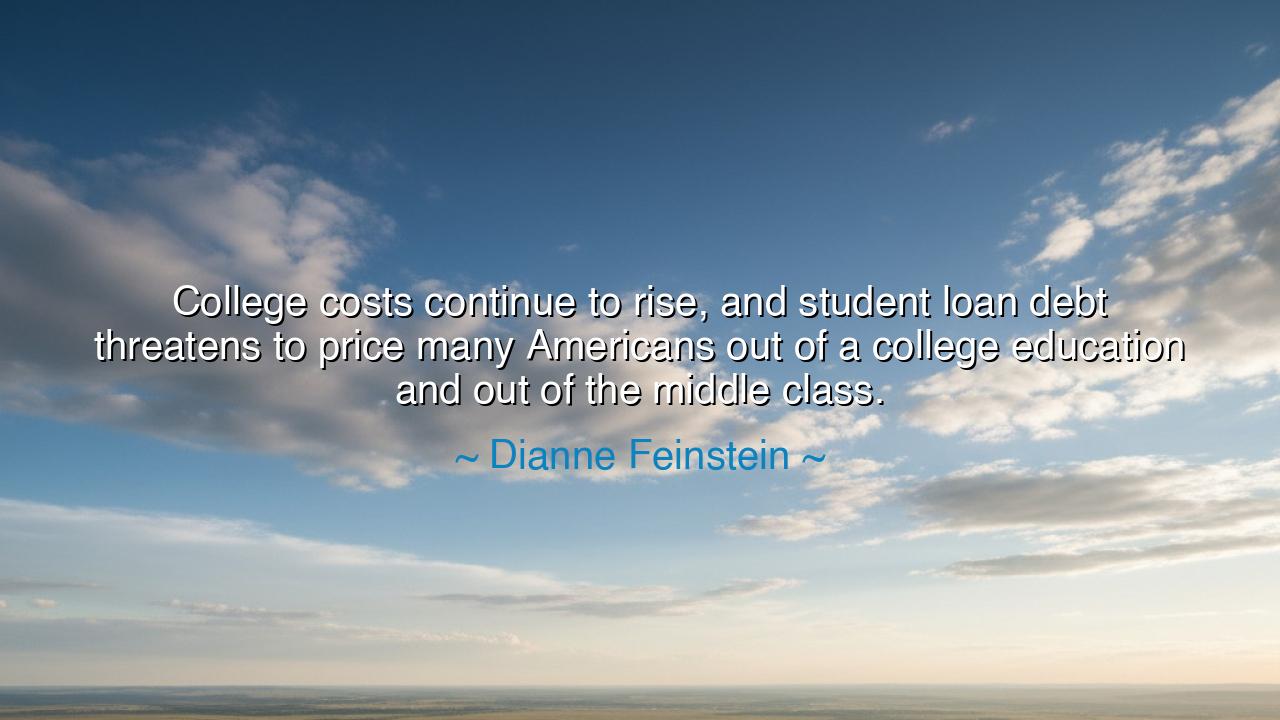
College costs continue to rise, and student loan debt threatens
College costs continue to rise, and student loan debt threatens to price many Americans out of a college education and out of the middle class.






The words of Dianne Feinstein—“College costs continue to rise, and student loan debt threatens to price many Americans out of a college education and out of the middle class.”—carry with them both lament and warning. They are spoken not as idle observation but as a cry from one who has seen the widening chasm between promise and reality. For generations, the path to the middle class in America was marked by education, by the steady ascent of those who labored in study, who invested in knowledge as a ladder to a better life. Yet Feinstein declares that this ladder is breaking beneath the weight of rising costs and student loan debt, and that what was once the gateway to opportunity now risks becoming a gate of exclusion.
To say that college costs continue to rise is to recognize a crisis that unfolds year by year, as tuition climbs beyond the reach of ordinary families. What was once a manageable investment has grown into a burden so heavy that many dare not attempt it, while others begin their adult lives already shackled by debt. The promise of higher education, that it would open doors and grant freedom, has been overshadowed by fear: fear of bills, of interest, of decades chained to repayment. Feinstein’s words echo this despair, for a society that prices its youth out of education also prices itself out of hope.
The mention of the middle class is no small matter. In America, the middle class has long been the backbone of democracy and prosperity, the broad foundation upon which stability rests. Education has been the chief road to enter it, lifting children of farmers, laborers, and immigrants into professions and trades that offered security and dignity. Yet if education itself becomes a luxury, reserved only for the wealthy, then the middle class will shrink, the divide between rich and poor will widen, and the nation will stagger beneath inequality.
History bears witness to this truth. After the Second World War, the G.I. Bill granted millions of veterans access to higher education. It was not charity but investment, and the result was an explosion of growth, innovation, and prosperity that lasted for decades. The middle class expanded, new industries thrived, and America stood tall in strength and knowledge. Compare this to our own time, when countless students graduate burdened with debt so heavy it delays marriage, homeownership, and entrepreneurship. The contrast is stark: where education was once a springboard, it has become an anchor.
Feinstein’s warning is also a moral one. A nation that denies its people access to education denies them access to their own potential. It leaves talent untapped, dreams unfulfilled, inventions unborn. Worse still, it risks a society divided between those who can afford to learn and those who cannot—a society of masters and servants, not citizens of equal worth. Such a course weakens not only the economy but also the soul of the nation, for education is not merely about wealth, but about dignity, freedom, and the ability to participate fully in civic life.
The lesson, then, is clear. We must treat education not as a privilege, but as a right to be protected and nourished. Families must encourage learning, even when the road is difficult. Communities must demand fairness in the cost of education. Leaders must labor to reform the system, to lighten the burden of debt, to ensure that the doors of colleges and universities remain open to all who would strive to enter. For the wealth of a nation is not in its vaults, but in the minds of its people.
So, O listener, let Feinstein’s words be a trumpet in your ears. If you are young, do not surrender your dream of education, but pursue it with courage and seek every path of support. If you are older, lend your voice to reform, to policies that strengthen access and reduce debt. Remember always that the middle class is the heartbeat of a just society, and that its strength depends on the learning of its people. For as education rises, so rises the nation; but if it falls, so too will the promise of democracy and the hope of tomorrow.






AAdministratorAdministrator
Welcome, honored guests. Please leave a comment, we will respond soon